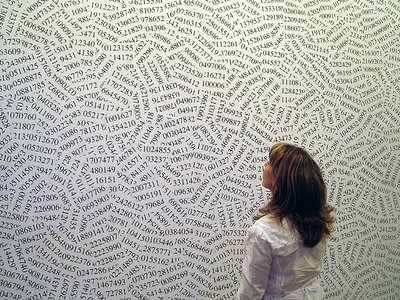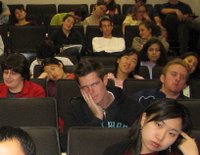
Miss Winter’s back, and honey, payback is a bitch. I have nothing really more to add other than it was really depressing to close my storm windows today, after one too many moments of waking up in the middle of the night frigid and cold. The sudden slip from autumn to mid-winter blah has even caught the Cold City natives off-guard, coming as early as it has this year. Will there be a warming trend? Perhaps, but warming in this case means 60º and without flurries. Goodbye 70º and warm sun, to come back at the end of April, if we’re lucky. Oh well, at the very least I can now wear my delicious woolens without shvitzing up a storm. Meanwhile, on the phone with Mahku yesterday afternoon, he was having the shvitz for both of us, outside a laundromat in El Ay with a temperature above 80º and climbing with a sunny sky. So what else is new?

Our lives have become so dependent on technology, both in the personal and professional sense; it can be amazing and incredibly disquieting at the same time. One of the things Mahku and I talked about was Doctor Town, and how our doctoral university has changed, and reminiscing about paper memos and the world before email, the ubiquitous email we live within nowadays. We commiserated about how we both tended to be bad email responders, sometimes leaving messages for weeks, if not months (if not, in fact, years). I was reminded of a passage by Joan Didion in her sublime essay “The White Album,” where in the midst of one of her depressive states she would neglect her correspondence, only to respond months later with the pithy, “During my absence from the country for these past 18 months…”
If only such easy solutions were available to us! Cold City U.’s email system takes electronic snooping (and egghead OCD) to another level by enabling you to see when the recipient of your message has opened it and even if they forwarded it. When I first arrived, I would use this feature endlessly, until finally I tired of it. After all, did it really matter that I knew that Professor X opened said message at whenever? No, because by that point I was just hoping they wouldn’t respond at all. What really sucks about it is the fact that students can also use this tool. So, we surveille and are surveilled in our electronic haimische.

My mind has been on this old-new electronic village thingy tonight for a couple of reasons, the primary one being the entire evening has been taken up composing a PowerPoint midterm answer review for my classes tomorrow, covering the exams which my students took last week. I know that PowerPoint has a terrible reputation, and personally I find that most of the time the old-fashioned writing on the board is more effective than a nerdy, overly composed PPT presentation that glazes your students’ eyes like a candied ham. But I have discovered that in fact PowerPoint can be useful when you have to communicate a massive amount of information in a short period of time, and as such is a useful tool if of dubious reputation. The fact that students also seem to regard it as more “real” than the scribblings on the blackboard helps the evals ("He was prepared." In the parlance of the electronic shtetl: LOL), but also speaks to the electronic bells and whistles that pass as sophistication and labour nowadays. Smoke and mirrors, really. I remember composing my first high school essays on an IBM Selectric that my mother had, um, requisitioned from her office, and that in 1984 was the height of technology. But it was still hard copy, and therefore fallible in a frustrating way (especially when your automatic corrective tape ran out). When I arrived at Prestigious Eastern U., I quickly became an aficionado of Mac, and the magic of the word processor, a distinction between technologies completely lost today ("magic" v. Liquid Paper). The poor long-gone typewriter, textual siren for one hundred years, overturned and scrapped in less than a decade by the pixilation of the computer screen. Now we compose and think electronically, and one must wonder sometimes if we have indeed become Haraway’s cyborgs in real time, mediated and created and sustained by our technology (as techne).
Stepping down a bit from these lofty heights, the other aspect of our little electronic shtetl that both delights and cautions is the now ubiquitous (and Google-owned) YouTube. As I began to explore the contours of the site last year, I was struck as most were by the funny, the inane, the ridiculous. But what is interesting is that very quickly YouTube has not only become a stage for every American Scooby as well as corporate entity, but also become a kind of time machine, where the past is being rescued, one pathetic video upload at a time.
So, a few weeks ago, I found this little gem: a video by the eighties Black British Rap-Dance group Cookie Crew. During the summer of 1989, La Zeez and I listened to their album Born This Way constantly, as we cruised the student-less streets of PU town, looking for adventure in a fifth of Bacardi and listless late night trips to the playground to drunkenly do the swings and have those intimate conversations that seem so important to a 19-year old but are remarkably forgotten later (perhaps blissfully forgotten). How I heard about Cookie Crew escapes me at this moment, although once I was able to pull off a wry joke many years ago on Isaac Julien (yes, that Isaac Julien) by popping in a tape of Deee-lite's fantabique Dewdrops in the Garden (in Mahku’s old car, actually) and turning around precociously and declaring that it was Cookie Crew’s latest tape. The referent seemed so British, so private, that Julien's eyes got big, not only because the musical styles were mismatched, but also because who in the hell in North America even knew about Cookie Crew?

I did, and this music video from long ago, aside from the obvious laughs generated by the crazy Afrocentrique fashions and wild fades of the eighties (Remember Kid 'N Play?), made me think of La Zeez and listless summers and being broke, but also of the project of many of us during that time: reaching out, exploring the world, feeling the contours of ourselves and our place in the world, both personally and intellectually, finding connections and messages in strange and unexpected places. This was around the time I was introduced to Stuart Hall in a seminar on the decline of Britain, going to mixers at the Afro-Am Centre where young PU students of colour were dancing to Kraftwerk and Sade and Mantronix and Africa Bambaatta and Jody Watley, where the biggest question about any party was “who’s doing the music?” which was also a question full of racial and cultural connotation, where some of us wore Kikit or Matsuda and others J. Crew, back when Matthew Barney (yes, that Matthew Barney) was still one of their preppy models. This diasporic iconoclasm of symbols and things and ideas and trends has today come to mean, in some simplistic and reductionist ways, globalisation, but makes me wonder about other tropes, other directions of thinking through these connections, however deep or facile they may have been.

What has led me to this place is not only rediscovering, after almost twenty years, that Cookie Crew wasn’t half bad, but wondering about the cultural fusions of Latin@ and Black identity, which perhaps are now writ larger and beyond those particular experiences, but seem to be very much grounded in a kind of unauthorised knowledge. We know of course, as we knew in the eighties, about Mothers Africa and Mexico. But what about Fathers England and France? Some Chican@s do live in a peripatetic museum of lo mexicano, which has always struck me as incredibly kitschy in a specifically American way. I mean, Mexico has skyscrapers and subways and malls and freeways and all the accoutrements of modern life. It’s not all grandma and the burro. And it’s not all exclusively American (or Western) global economic imperialism, but a specifically Latin American take on those things, wonderful and horrible, those aspects of technology which in the Western mind (here I include some earnest Latin@s) are exclusively the property of the developed world.

So, in letting lo mexicano become modern, I too sought (and continue to seek) to let lo chicano become modern as well, but back when Cookie Crew (a fusion of Black American rap modalities, Black British signifiers, Euro-American electronic-funk sounds and diasporic Afrocentric empowerment themes) was playing on the portable tape player in La Zeez’s beat up powder blue Cadillac car (because her installed radio had been stolen, the bane of the eighties), this was not necessarily an intellectual project, it was more like a way of living. Insatiable curiosity and desire colliding with expectation and stereotype in ways that diasporic Latin@s and Black communities always provide, much to our collective hand wringing and heavy sighs. Once, in graduate school, an über-earnest Puerto Rican student peer declared that once the masses knew about transnational capital, everything would change. I was then, and still am, astounded by the naïveté of the remark. The masses already know from transnational capital, and what they want is their slice (or sliver, or crumb, or whatever). But what else is graduate school for other than revolutionary dreamers and dreaming? In my experience, Latin@ and Black diasporic experience is about not towing the line, is about challenging us in ways that confound and disappoint and delight all at the same time. I would like to think that I play my own little part in this larger cultural drama, singing along on YouTube to Cookie Crew. Who knew?
(to be continued)



No comments:
Post a Comment